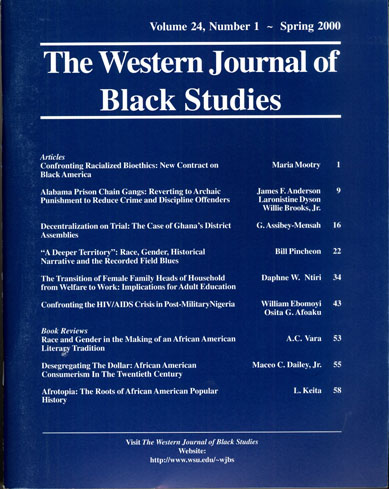Volume 24, Issue 1
Confronting Racialized Bioethics: New Contract on Black America
Maria K. Mootry
This essay analyzes why the American dream is failing African-Americans on three levels: increasing acts of racial violence, continuing withdrawal from liberal policies by middle-class White Americans, and new forms of academic intellectual racism, particularly with regard to medical science. As a remedy for these social ills, particularly the latter the essay presents Professor Mootry’s theory of racial principalism including her paradigm: Ten Tasks of Racialized Bioethics.
pp. 1–8
Alabama Prison Chain Gangs: Reverting to Archaic Punishment to Reduce Crime and Disciline Offernders
James F. Anderson, Laronistine Dyson, and Willie Brooks, Jr.
While once seen as brutal and unconstitutional, the Alabama Department of Corrections (ADC) has revived the use of chain gangs. State officials contend that this correctional practice is designed to reduce rising crime rates, repeat offenders, and address disciplinary problems in ADC. Opponents, however; find this practice dehumanizing and dangerous. Still, proponents view it as a form of shaming that could have a deterrent effect on future criminal behavior.
pp. 9–15
Decentralization on Trail: The Case of Ghana's District Assemblies
George O. Assibey-Mensah
In 1987, Ghana's administration under the Provisional National Defence Council (PNDC) military regime of Jerry Rawlings decentralized both budgeting and economic development by instituting 110 District Assemblies. The primary rationale is to effectively ameliorate the masses 'living conditions via a basic human-needs approach, using those institutions as the instruments for making localities determine their respective development destinies. This article is a case study of those subnational bodies, addressing certain key issues falling within the general framework of post-independent developing-states' decentralization, particularly subnational flnancing of development. The article provides fruitful and penetrating insights into some of the reasons for the success or failure of subnational governments, particularly in developing societies, as well as some of the dilemmas facing governments of these developing societies in their development efforts. The focus of this article is more the theoretical framework of decentralization within which the Assemblies operate and less their activities.
pp. 16–21
"A Deeper Territory":
Race, Gender, Historical Narrative and the Recorded Field Blues
Bill Pincheon
In this article, I examine Afro-American folk narrative as structural model underlying black cultural forms, black music performance in particular, paying special attention to sociocultural contexts. For much of my analysis of the blues as a type of poetic narrative, I examine William Ferris' study of field-recorded blues, Blues from the Delta. My emphasis upon folk narrative as foundation flows from my interest in finding a unifying principle or theory to connect various aspects of black culture from a folkioristic standpoint, that is to look at traditional aspects of expressive culture in such a way as to bridge the gap between such assumed dichotomies as popular and traditional and sacred and secular in the analysis of African American expressive culture.
pp. 22–33
The Transition of Female Family Heads of Household from Welfare to Work:
Implications for Adult Education
Daphne W. Ntiri
This paper explores the impact of the New Welfare reform bill on female heads of households and argues that the push for welfare recipients to end welfare dependency and enter the job market ill-prepared presents daunting challenges both on the home front and at the workplace. While inadequate education and poor work skills contribute to job volatility for the women, lack of child care and other social and domestic issues present serious obstacles to occupational success. A restructuring of priorities is advocated with emphasis on educational readiness through literacy opportunities and advanced education. Adult educators 'role in preparing low-skilled mothers for the workplace is therefore seen as central in welfare reform policies.
pp. 34–42
Confronting the HIV/AIDS Crisis in Post-Military Nigeria
William Ebomoyi and Osita G. Afoaku
This paper explores the prospects for sustained international intervention against the African HIV/AIDS crisis. Factors that account for the upsurge of the epidemic on the continent are discussed in detail. While the authors agree with proponents of a human rights rationale for collective action on behalf of Africa's teaming HIV/AIDS victims, they argue that international support to the former will continue to arrive in trickles in view of traditional neglect of African problems in the policies of the developed countries. Against this background, they propose key elements of a comprehensive strategy for stemming the spread of the HIV/AIDS epidemic in Arican countries.
pp. 43–52
Book Reviews
Race and Gender in the Making of an African American Literary Tradition
Author: Aimable Twagilimana
Reviewed By: A. C. Vara
pp. 53-54
Desegregating the Dollar:
African American Consumerism in the Twentieth Century
Author: Robert E. Weems, Jr.
Reviewed By: Maceo C. Dailey, Jr.
pp. 55–57
Afrotopia: The Roots of African American Popular History
Author: Wilson Moses
Reviewed By: L. Keita
pp. 58–60

| The WJBS site is normally maintained by Tanya Gonzales. Please feel free to e-mail comments, queries, and suggestions. |
Heading using the h3 tag
Lorem ipsum dolor sit amet, consectetur adipisicing elit, sed do eiusmod tempor incididunt ut labore et dolore magna aliqua. Ut enim ad minim veniam, quis nostrud exercitation ullamco laboris nisi ut aliquip ex ea commodo consequat. Duis aute irure dolor in reprehenderit in voluptate velit esse cillum dolore eu fugiat nulla pariatur. Excepteur sint occaecat cupidatat non proident, sunt in culpa qui officia deserunt mollit anim id est laborum.